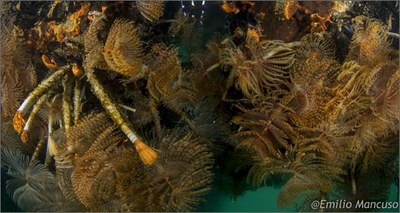Environment: Italy’s first “Smart Bay” to study climate change set up in Liguria
17/6/2021
 A hi-tech laboratory to study algae, bryozoans, molluscs and corals- organisms which have not received due attention but are essential to climate change adaptation and mitigation strategies- set up in the Bay of Santa Teresa. With this pilot project, Italy’s first Smart Bay- a collaborative platform promoted by ENEA jointly with CNR, INGV, Municipality of Lerici, Scuola di Mare Santa Teresa and Cooperative of Associated Mussel Farmers- was officially launched.
A hi-tech laboratory to study algae, bryozoans, molluscs and corals- organisms which have not received due attention but are essential to climate change adaptation and mitigation strategies- set up in the Bay of Santa Teresa. With this pilot project, Italy’s first Smart Bay- a collaborative platform promoted by ENEA jointly with CNR, INGV, Municipality of Lerici, Scuola di Mare Santa Teresa and Cooperative of Associated Mussel Farmers- was officially launched.
The initiative, presented during the European Maritime Day, aims at the joint management of marine and atmospheric research infrastructures and testing of advanced technologies to support sectors with high potential for sustainable growth and employment such as aquaculture, tourism, marine biotechnologies and marine energy, in line with the objectives of the Blue Italian Growth (BIG) technology cluster in the broader context of the European Blue Growth strategy.
“The Smart Bay of Santa Teresa has the purpose of promoting research and technologies, strengthening our support to local contexts while protecting and enhancing the natural capital of the gulf”, Roberto Morabito, Head of the ENEA Department of Sustainability of Productive and Territorial Systems, said. “Our goal – Morabito continued - is to implement the knowledge of marine ecosystems and the services they offer also in relation with the objectives of the ecological transition.
Furthermore, by integrating the scientific, tourist / recreational and educational activities created, we want to set up a first model of sustainability and cooperation replicable in other areas, helping to strengthen Italy’s research on marine sciences ".
As part of the pilot project, the role these marine ecosystems play in providing "ecosystem services" like climate regulation, support and supply of habitats as well as cultural and aesthetic contributions, will be studied. The project comprises CNR, Municipality of Lerici, Cooperative of Associated Mussel Farmers, Scuola di Mare, the Universities of Florence, Pavia, Portsmouth and Sapienza, the Zoological Station of Naples and the W · SENSE company.
In addition to data on the physiology of ecosystems (respiration, photosynthesis, calcification, growth) in current and future conditions, the distribution and extension of some species will also be acquired with terrestrial and marine drones. Parameters such as pH, pCO2, calcite, aragonite and nutrients will be detected by in situ probes and weekly and monthly measurement campaigns and temperature, salinity and oxygen by the ENEA weather station. Thanks to the collaboration with Sapienza University, high-tech sensor systems designed by the company W SENSE will be tested, acquiring temperature, current and oxygen data in the bay and other sites in the gulf, including mussel farming, accessible in real time over wi-fi from local stakeholders.
The information collected will then be examined through an economic, social and ecological perspective to determine the economic value of the ecosystems. "Understanding how these marine ecosystems work, their mutual influence with the environment and improving their social perception is the basis for planning a true ecological transition that involves researchers, stakeholders, administrators and citizens", Chiara Lombardi, researcher at the ENEA Biodiversity and Ecosystem Services Laboratory in the Santa Teresa Research Center, pointed out.
"The Santa Teresa Smart Bay was created to build a platform for dialogue and cooperation among different players, in a small but valuable territory, to promote Blue Growth through exchange and collaboration based on research, innovation, production or tourism, with ecosystems and technology at the center ”.
For more information please contact:
Chiara Lombardi, ENEA – Biodiversity and Ecosystem Services Laboratory, Santa Teresa Research Center, chiara.lombardi@enea.it
